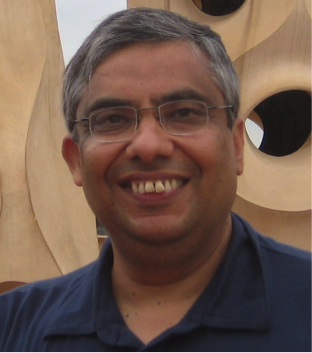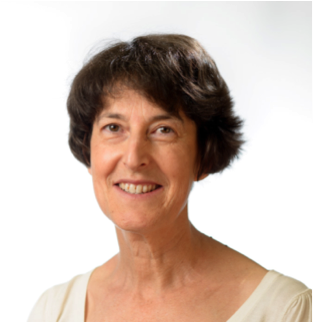Keynotes
The 9th International Conference on Educational Data Mining is proud to host three fantastic keynote speakers this year.
Rakesh Agrawal

Talk: Data-Driven Education: Some opportunities and Challenges
June 30, 9:00 -10:00 am
A program of study can be viewed as a knowledge graph consisting of learning units and relationships between them. Such a knowledge graph provides the core data structure for organizing and navigating learning experiences. We address two issues in this talk. First, given a knowledge graph, how can we use data mining to identify and correct deficiencies in a knowledge graph. Second, how can we use data mining to form study groups with the goal of maximizing overall learning. We conclude by pointing out some open research problems.
Biography
Rakesh Agrawal is the President and Founder of the Data Insights Laboratories. He is a member of National Academy of Engineering, a Fellow of ACM, and a Fellow of IEEE. He has been both an IBM Fellow and a Microsoft Fellow. ACM SIGKDD awarded him its inaugural Innovations Award and ACM SIGMOD the Edgar F. Codd Award. He was named to the Scientific American's First list of top 50 Scientists. Rakesh has been granted 80+ patents and published 200+ papers, including the 1st and 2nd highest cited in databases and data mining. Four of his papers have received "test-of-time" awards. His research formed the nucleus of IBM Intelligent Miner that led the creation of data mining as a new software category. Besides Intelligent Miner, several other commercial products incorporate his work, including IBM DB2 and WebSphere and Microsoft Bing.
Marcia C. Linn

Talk: WISE Ways to Strengthen Inquiry Science Learning
July 1, 9:00 -10:00 am
The Web-based Inquiry Science Environment (WISE) logs student and teacher interactions during classroom science inquiry instruction. Over the past 10 years we have used these logs for many purposes including: to analyze patterns of student interactions with dynamic, interactive scientific models and improve instruction; to determine when students revisit prior activities and assess whether the visit was fruitful; and to analyze the coherence of student essays and offer personalized guidance. I will illustrate our findings with some successes and failures as we attempt to: validate what a sequence of logged actions means; measure a key learning construct with logged interactions; and determine how to use scores derived from logged variables to guide student inquiry learning.
Biography
Marcia C. Linn is Professor of Development and Cognition, specializing in science and technology in the Graduate School of Education, University of California, Berkeley. She is a member of the National Academy of Education and a Fellow of the American Association for the Advancement of Science (AAAS), the American Psychological Association, and the Association for Psychological Science. She has served as President of the International Society of the Learning Sciences, Chair of the AAAS Education Section, and on the boards of the AAAS, the Educational Testing Service Graduate Record Examination, the McDonnell Foundation Cognitive Studies in Education Practice, and the National Science Foundation Education and Human Resources Directorate. Awards include the National Association for Research in Science Teaching Award for Lifelong Distinguished Contributions to Science Education, the American Educational Research Association Willystine Goodsell Award, and the Council of Scientific Society Presidents first award for Excellence in Educational Research.
Linn earned her Ph. D. at Stanford University where she worked with Lee Cronbach. She spent a year in Geneva working with Jean Piaget, a year in Israel as a Fulbright Professor, and a year in London at University College. She has been a fellow at the Center for Advanced Study in Behavioral Sciences three times. Her books include Computers, Teachers, Peers (2000), Internet Environments for Science Education (2004), Designing Coherent Science Education (2008), WISE Science (2009), and Science Teaching and Learning: Taking Advantage of Technology to Promote Knowledge Integration (2011). She chairs the Technology, Education—Connections (TEC) series for Teachers College Press.
Judy Kay

Talk: Enabling people to harness and control EDM for lifelong, life-wide learning
July 2, 9:00 -10:00 am
There has been an explosion of digital learning sensors. Some are in bespoke learning applications. But many more are in the digital tools people use in every aspect of their lives. This paper introduces a user-centred view of EDM for lifelong, life-wide learning. That includes formal education, but goes beyond it to the complex, multi-faceted and ill-defined learning in our broader lives. This is the learning that takes decades and is critical for aspects as diverse as health and wellness, responsible citizenship or working effectively with other people.
The paper begins by asking who the users for EDM are, what their different needs are, and why the answers matter. It then reviews a series of case studies for learning group-work skills. These illustrate the analysis that follows. This starts with the issues for personal data sensing for learning over the long term, in many contexts and aspects of life. Then it considers middleware, a topic rarely discussed in EDM research. Finally, it considers the all important user interfaces for: user control; human-in-the-loop EDM; and learning, particularly, self-monitoring, reflection, planning and broader metacognitive activity. This paper takes a highly critical assessment of over 20 years of my research, from the perspective of user-centred EDM. Building upon that critique, it summarises major mistakes made and lessons learnt and then presents a research agenda and vision.
Biography
Judy Kay is Professor of Computer Science. She leads the Human Centred Technology Research Cluster, in the Faculty of Engineering and IT at the University of Sydney. Her own lab, CHAI, Computer Human Adapted Interaction Research Group, aims to create new technologies for human computer interaction (HCI). A core focus of her research has been to create infrastructures and tools for personalisation, especially for teaching systems. Central to this has been in the design of Open Learner Model interfaces that enable people to scrutinise and control the system's model of them and personalisation processes based on it. Other interface research includes the Cruiser Natural User Interaction (NIU) software framework. This provides new ways for people to interact with large surfaces, on tabletops and walls. By mining the digital footprints of such interaction, this research is creating new ways for people to learn to collaborate, and to collaborate to learn and work.
Her research has been commercialised and deployed and she has extensive publications in leading venues for research in AIED, human computer interaction and personalisation. She is co-Editor-in-Chief of the International Journal of Artificial Intelligence in Education.






